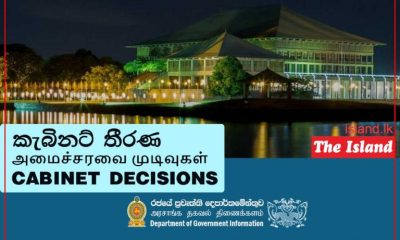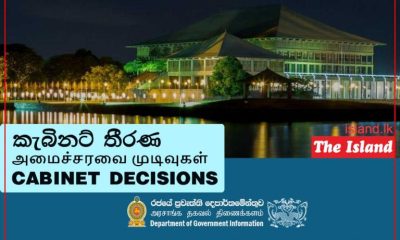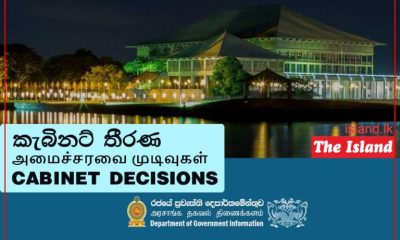News
Delisting of Tamil Diaspora groups irks some; explanation sought
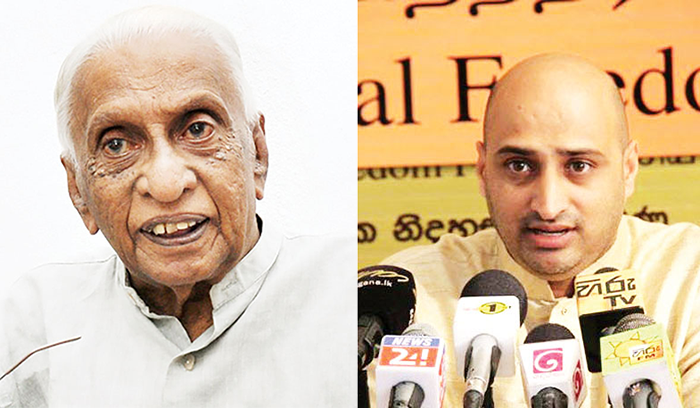
Decision based on GoSL assurance given in Geneva last June
By Shamindra Ferdinando
Dr. Gunadasa Amarasekera yesterday (14) said President Ranil Wickremesinghe’s government should explain the rationale behind delisting several Tamil Diaspora groups and individuals.
“The timing of the government announcement really worries us,” Dr. Amarasekera said on behalf of the Federation of National Organizations (FNO). He said such moves couldn’t be simply justified on the basis of the forthcoming sessions of the Geneva-based United Nations Human Rights Council. The next UNHRC sessions are scheduled for September.
Recalling that he too strongly backed the stand taken by President Wickremesinghe with regard to US Ambassador Julie Chung’s opposition to measures the government adopted to counter violent protests, Dr. Amarasekera emphasised national security couldn’t be jeopardised by politically-motivated decisions. The Defence and Foreign Ministries owed the public an explanation as regards the procedure adopted in delisting some Tamil diaspora groups and individuals.
The UK-based Global Tamil Forum (GTF), the British Tamil Forum (BTF) and the Canadian Tamil Congress (CTC) had been among those delisted, through an Extraordinary Gazette issued by the Ministry of Defence.National Freedom Front (NFF) spokesperson Mohammed Muzammil, MP, too, echoed Dr. Amarasekera’s concerns. Addressing a hastily arranged media briefing at NFF’s Pita Kotte party office, lawmaker Muzammil asked whether the government had received an undertaking from those delisted groups, and individuals, whether they would abandon the separatist agenda. Lawmaker Muzammil said President Wickremesinghe, who holds the defence portfolio, should address the concerns of those who felt betrayed by the disputed de-listing of those who propagated separatist ideology though the armed forces eradicated the LTTE in 2009.
Both Dr. Amarasekera and MP Muzammil pointed out that Tamil Makkal Theshiya Kutani leader C.V. Vignewaran, following a recent meeting with President Wickremesinghe, had declared that he received an assurance with regard to several of their demands. They asked whether the de-listing of these organizations, and individuals, had been part of the agreement between Tamil political parties and President Wickremesinghe.
The Island
sought the views of Suren Surendiran of the GTF, who is among those delisted. The UK-based GTF spokesperson alleged that the entire process of designation of groups and individuals was arbitrary, irrational, and an outright abuse of the United Nations Regulations – aimed at suppressing freedom of speech and dissent, not just within Sri Lanka but also across the borders.
“GTF and I were listed in 2014, delisted in 2015, re-listed in 2021 and re-delisted in 2022,” Surendiran said, declaring they remained committed to their original ideals meant to achieve justifiable aspirations of the Tamil-speaking people, and implementation of the 2015 accountability resolution.
Surendiran has sent us the following response: “Every time when a resolution is passed at the UNHRC, calling for Accountability and Reconciliation, the Rajapaksas, be it Mahinda or Gotabaya, will proscribe us as an angry reaction and then realise that no other government or international institution, including progressive Sri Lankans of all communities, and the wider media, recognise these proscriptions and just before another UNHRC session, the sitting government will de-proscribe us. This has been the case since 2014.”
“GTF is grateful that the international community and many Sri Lankan stakeholders (including the media) ignored this listing for what it truly was.
“We did an estimation on the loss of foreign currency inward flow into Sri Lanka directly related to these proscriptions of 2014 and 2021, at least per annum the loss has been USD 300 mn to half a billion dollars.
Former Presidents Mahinda Rajapaksa, Gotabaya Rajapaksa, Secretary of Defence Kamal Gunaratne, Former Foreign Minister G L Peiris and the notorious so called “terrorism expert” Rohan Gunaratna must explain these losses to the Sri Lankan people and held accountable for their arbitrary decisions and explain what benefits these proscriptions achieved.”
Authoritative sources said that contrary to concerns expressed by various iparties as regards the delisting of organizations and certain individuals, the decision to do so was announced by the former Foreign Affairs Minister Prof GL Peiris in mid-June this year at the 50th Geneva sessions. The Foreign Ministry quoted Prof. Peiris as having said: “The list of designated individuals, groups and entities under the United Nations Regulation No. 1 of 2012 is being reviewed. As of now 318 individuals and 04 entitles are proposed to be delisted. This is a continuing exercise.”
Sources said that it wouldn’t be fair to seek explanation from the incumbent government for a decision taken by the previous administration.
News
Cabinet nod to accept Japanese government grant of 08 used low floorboard buses
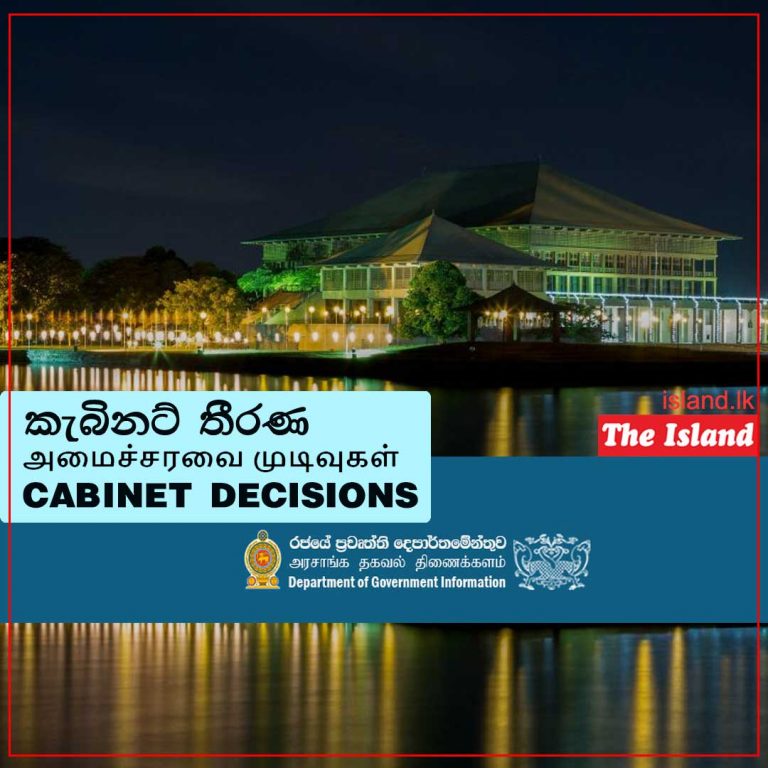
The Cabinet of Ministers approved the resolution furnished by the Minister of Transport, Highways and Urban Development to accept 08 used low floorboard buses offered as a grant by the Government of Japan.
News
Payment of the financial subsidy for fertilizer to farmers cultivating paddy lands for the Yala season 2026.
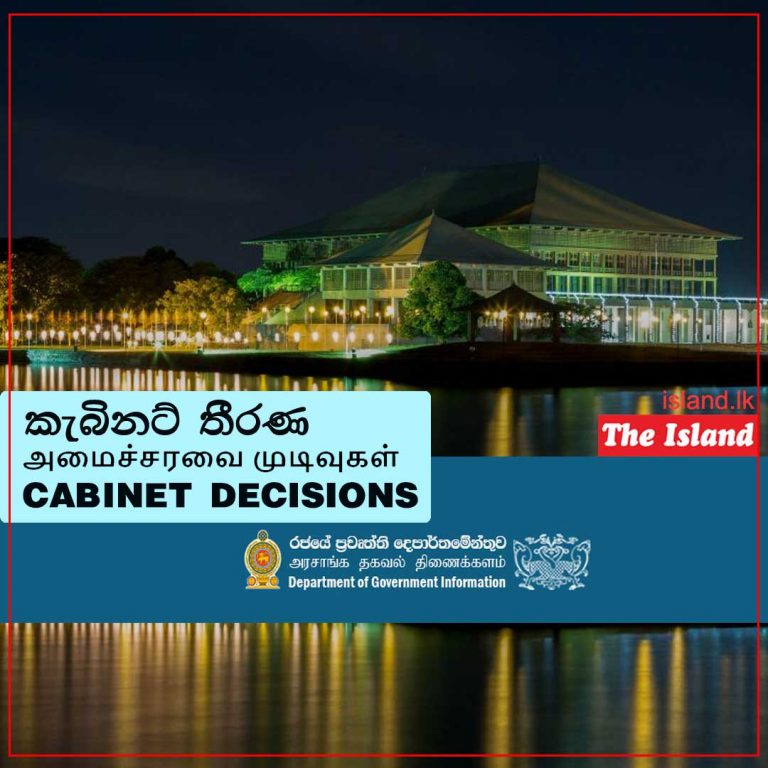
While approval has been granted at the Cabinet meeting held on 18.08.2025 to pay the financial subsidy for fertilizer to farmers cultivating paddy lands for the Maha season 2025/26, the programme is planned to be continued for the Yala season 2026 as well.
Accordingly, the Cabinet of Ministers approved the resolution furnished by the Minister of Agriculture, Livestock, Lands and Irrigation to pay a financial subsidy of Rupees 25,000/- per hectare and for a maximum of 02 hectares per farmer for paddy cultivation and to pay Rupees 15,000/- per hectare for field crops cultivated in paddy lands[maximum of 02 hectares per farmer]
News
Ministerial Committee appointed to submit recommendations on proposed program to mitigate loss of crops to wild animals
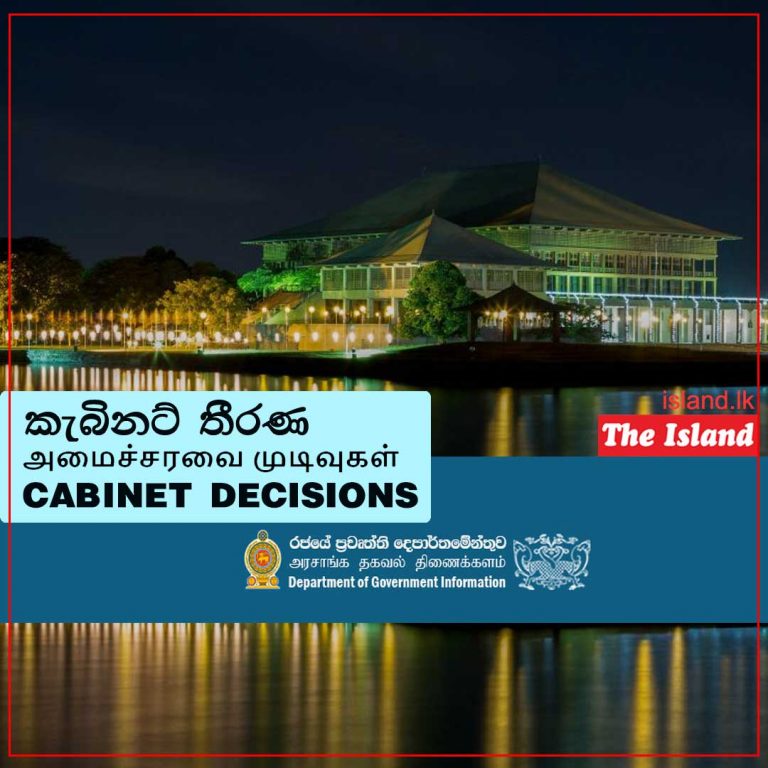
The rural agricultural livelihood and food security have been severely impacted due to the damage caused by wild animals such as elephants, wild boars, monkeys, toque macaque, squirrels, and peacocks roaming around human habitats and cultivated lands.
Animal-human conflicts and property destruction have mostly been reported around these areas, and serious social and economic issues have also arisen.
Therefore, the Ministry of Agriculture, Livestock, Land, and Irrigation has prepared a comprehensive program based on the opinions of all stakeholders, including the public, university community, farmers’ organizations, environmentalists, non-governmental organizations which work for environmental issues, the Department of Agriculture, the Department of Agrarian Development, and other relevant organizations.
Taking into consideration the report submitted by the Minister of Agriculture, Livestock, Land, and Irrigation, the Cabinet of Ministers has decided to appoint a ministerial committee with the participation of other relevant ministers, chaired by the Minister of Agriculture, Livestock, Land, and Irrigation, to submit appropriate recommendations on how the aforementioned program should be implemented by further reviewing the proposals included in the said program and incorporating new proposals.
-

 Features3 days ago
Features3 days agoBrilliant Navy officer no more
-

 Opinion6 days ago
Opinion6 days agoJamming and re-setting the world: What is the role of Donald Trump?
-

 Features6 days ago
Features6 days agoAn innocent bystander or a passive onlooker?
-

 Features7 days ago
Features7 days agoRatmalana Airport: The Truth, The Whole Truth, And Nothing But The Truth
-

 Opinion3 days ago
Opinion3 days agoSri Lanka – world’s worst facilities for cricket fans
-

 Business7 days ago
Business7 days agoIRCSL transforms Sri Lanka’s insurance industry with first-ever Centralized Insurance Data Repository
-

 Business6 days ago
Business6 days agoAn efficacious strategy to boost exports of Sri Lanka in medium term
-

 Features4 days ago
Features4 days agoOverseas visits to drum up foreign assistance for Sri Lanka




